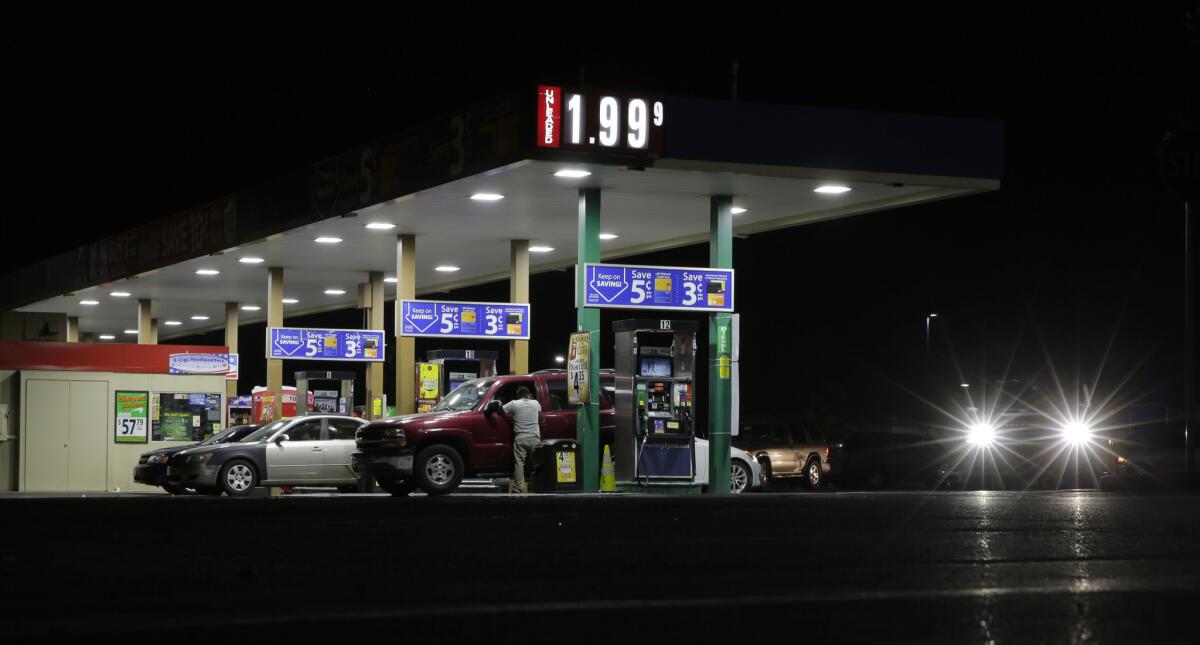Consumer prices fell in August and could give Fed pause on rate hike

Motorists purchase gas at a station that dropped the unleaded fuel price to $1.99 per gallon on Aug. 16 in San Antonio.
- Share via
Lower gas costs helped push consumer prices down last month for the first time since January, a sign of low inflation that could help persuade Federal Reserve policymakers to hold off on an interest rate hike this week.
The consumer price index fell 0.1% in August after an increase of 0.1% the previous month, the Labor Department said Wednesday. Analysts had expected prices to be flat.
The index had risen for six straight months as oil prices stabilized following sharp decreases that began last year.
SIGN UP for the free California Inc. business newsletter >>
Energy prices were the main reason for the August decline, the Labor Department said. Gasoline prices fell 4.1% last month, the first decrease since the spring. Lower oil prices also pushed down airline fares, which declined 3.1% in August.
The cost of food, another major component of the index, rose 0.2% last month.
So-called core prices, which exclude volatile food and energy costs, rose 0.1% in August, the same as the previous month.
Overall, consumer prices were up just 0.2% for the 12 months ended Aug. 31, the same annual rate as in July, the Labor Department said.
The figure is well below the Fed’s target of 2% annual inflation and could give policymakers a strong reason to delay raising the central bank’s benchmark short-term interest rate. They will announce their decision Thursday.
The Fed’s dual mandate is to maximize employment and keep prices stable. An unwritten third mandate for the Fed is financial stability, and the recent turmoil in global markets also could cause policymakers to wait on a rate hike.
But inflation might not be as low as it appears.
Core prices were up 1.8% for the 12 months ended Aug. 31. For the same period, gas prices declined 23.3%, more than offsetting a 1.6% increase in food prices.
Fed officials have said they expected the effects of lower oil prices to be temporary.
Inflation will be a key topic as central bank policymakers gather Wednesday for two days to decide whether to raise their benchmark federal funds rate for the first time since 2006.
The rate has been near zero since late 2008, during the depths of the Great Recession, in an effort to spur economic growth.
While the labor market has shown substantial improvement in recent years, Fed officials have been concerned that inflation remains low.
The Fed uses a different inflation indicator that is based on personal consumption expenditures. That measure showed prices up 0.3% for the 12 months ended July 31, the most recent data available. The core inflation figure, excluding food and energy, was 1.2% for the same period.
Follow @JimPuzzanghera on Twitter
ALSO:
A quest to rule the universe? Amazon’s Jeff Bezos expands his rocket plans
Hewlett-Packard will cut up to 30,000 jobs as part of restructuring
Apple’s new mobile operating system to include news app with ad blockers
More to Read
Inside the business of entertainment
The Wide Shot brings you news, analysis and insights on everything from streaming wars to production — and what it all means for the future.
You may occasionally receive promotional content from the Los Angeles Times.











